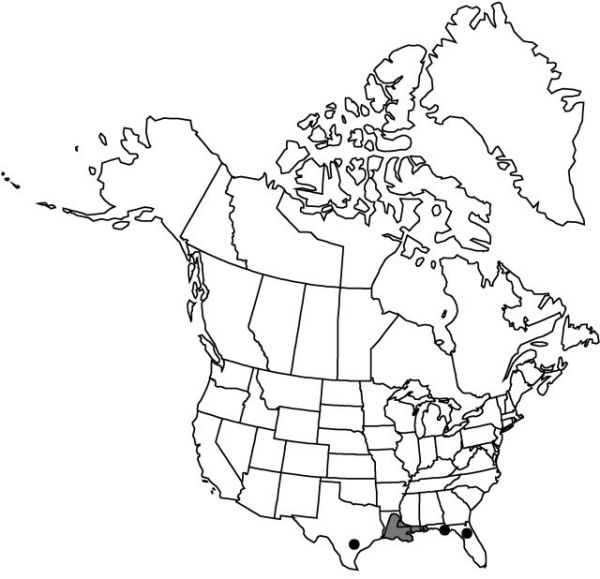Zephyranthes grandiflora
Bot. Reg. 11: plate 902. 1825.
Leaf-blade shiny green, to 7 mm wide. Spathe 3–4 cm. Flowers usually inclined; perianth pink, funnelform, 5.6–9 cm; perianth-tube green, (1.2–) 1.8–2.3 cm, increasing in diam., ca. 1/4 (1/5–1/3) perianth length, usually less than or equaling filament length, ca. 1/3–1/2 spathe length; tepals reflexed; stamens diverging, appearing equal; filaments filiform, 2–3 cm; anthers 13–22 mm; style longer than perianth-tube; stigma 3-fid, exserted more than 2 mm beyond anthers; pedicel 1.3–3.8 cm, usually shorter than spathe. 2n = 48.
Phenology: Flowering spring–early summer (Apr–Jul).
Habitat: Open areas in or near moist woods
Elevation: 0–100 m
Distribution

Introduced; Ala., Fla., La., Miss., Tex., e Mexico, West Indies, Central America
Discussion
Zephyranthes grandiflora frequently displays flowers with extra parts and has been widely distributed as an ornamental. Flowers with extra parts have been seen in Z. atamasca, Z. candida, Z. rosea, and Z. treatiae. Zephyranthes grandiflora also has been found to have a variable number of chromosomes in cells from single plants (R. O. Flagg 1961).
As a rule, the flowers of Zephyranthes species having high chromosome numbers, 2n = 48 or more, are built for self-fertilization, with the stigma borne very near (within 2 mm), among, or beneath the anthers (R. O. Flagg and W. S. Flory 1962). However, Zephyranthes grandiflora is an exception and often exhibits poor fertility.
Selected References
None.
Lower Taxa
"wide" is not a number."thicker" is not a number.